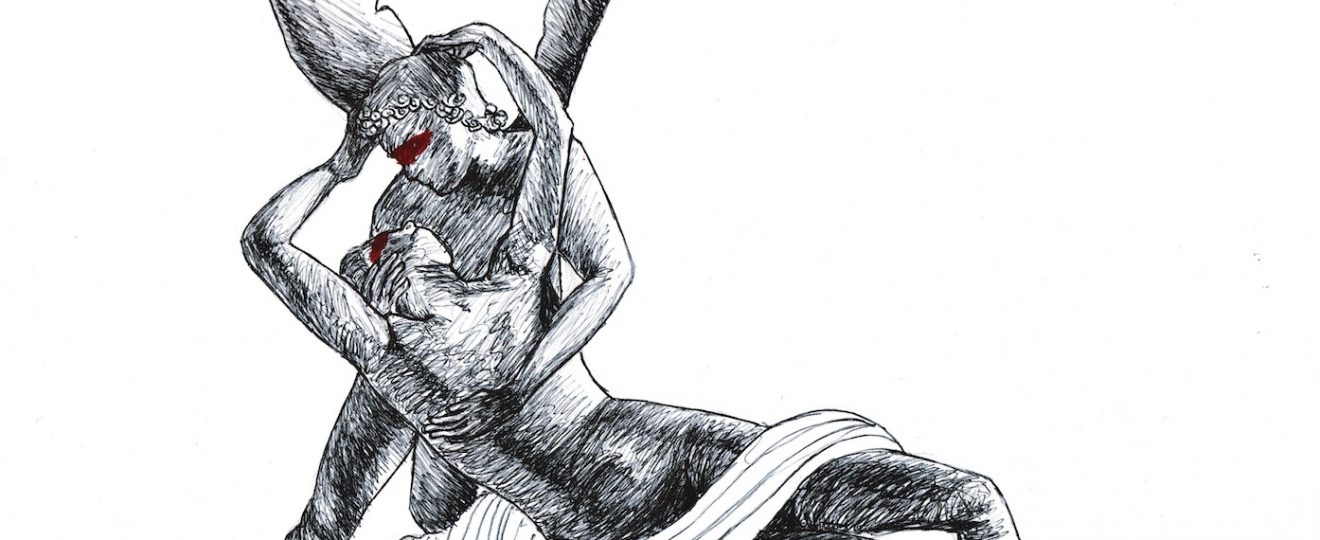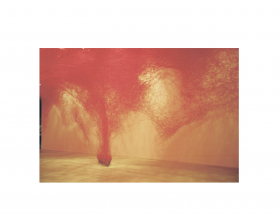Gay erotica writer Chuck Tingle has a book called Pounded in the Butt by the Handsome Physical Manifestation of Holiday Shopping.
I think what Mr. Tingle means to say is this: that if men can survive the usurpation of their soul by capitalism, they can survive getting fucked up the ass. Controversial, but we can start there.
***
When Antaeus—desert giant, Libyan king—was swept off his feet, what’d the poor guy see? I’ve thought about him there, lifted from the Earth. I imagine he looked upwards. Maybe for the first time, really. Not just a glance across the horizon, either, but an arching sort of gape into the hot blue abyss, a free fall of perception, nothing for his gaze to hold onto but that calm, leathery vertigo. That’s what I imagine he saw.
Before he was crushed to death, he would’ve bent over backwards like that, fingertips twinkling, reaching, trying to find his touch against the ground again. And the more he searched in the sky for the earth, the tighter the arms became around his waist. And then—pop. He died. Sad story.
***
Being crushed to death would be supremely unpleasant. It’s always been a fear of mine, and scenes of crushing have always struck me as especially horrific. Piggy’s death in Lord of the Flies comes to mind—death by boulder. And there are the countless deaths in horror movies I’ve seen too, like that John Cusack lookalike in Saw V, who gets pancaked between two mechanical walls, or the cave people in The Descent pressed into strawberry pulps by chunks of collapsing stone. Even more horrifying are stories of human stampedes, the quicksilver of bodies rushing over bodies, the indisputable calculus that sweeps its victims down under. And while the pain would be incredible, it’s the claustrophobia of it that really gets to me. The immediacy with which a body, unable to fly, is made aware of its boundaries.
On the other hand, the opposite scares me too, death in the air. I have a prankster father who would often pluck me from the ground and throw me above his head; one Christmas, in the Marshall Field department store in downtown Chicago, I refused to approach my dad near a bannister that overlooked the central lobby, where one could look down upon 10 or 12 cross-sectioned levels of the mall and imagine plunging to your death. When he asked what was wrong, I told him frankly. I knew what he was up to. He was going to hold me over the rail. One of his stupid jokes. In reassurance to me, my dad patted me on the back:
“John—that’s what Michael Jackson does.”
***
According to myth, there once was a giant named Antaeus. Classicists think he lived in Libya. Being the son of Gaia, Antaeus was invincible when in contact with the ground, and so he often challenged travelers to wrestling matches, gleefully dooming them to slaughter by his own hands.
When Heracles—that chronic protagonist—crosses paths with Antaeus one day, he too accepts the wrestling match. They spar for a while. Heracles can’t win. He knows that, so long as Antaeus is touching the Earth, he is immortal. So he does what no challenger has done before: Heracles embraces him.
Or, rather, he grabs Antaeus around the waist, lifts him into the air, and bear hugs him to death.
Imagine the noises. The bone sounds, the collapsing air, the red matter that tents from Antaeus’s mouth as he bursts asunder, limbs crawling frantically in a stationary tailspin. Heracles, hog-eyed, the edge of his gritted teeth grazing his opponent’s purpling, untethered ribcage. The sound of dusk in the desert—which tonight is the unbearable evacuation of sound, sucked into the lips of the horizon, everything silent except those wild animal grunts, persistent and strange. Heracles stretches open his mouth, pulls him closer.
Passing further down the valley, I’d think I was hearing the sound of lovers, in the middle of passionate fucking.
***
The Czech writer Milan Kundera has a very horny novel called The Unbearable Lightness of Being, where he envisions the great struggle of life as a conflict between lightness and weight. Kundera loves to categorize existence like this, to pit the supposedly innate forces of the world against each other, and here, characters who choose a breezy existence disappear ambiguously from the plot, while those who choose to cling to the things they love are literally crushed by a boulder at the end of the novel.
I think I like the story of Antaeus in part because it escapes this formula, or at least twists it around its own body. Think about it. Antaeus dies, lighter than he’s ever been, held in suspension above the world, and still, in the end he’s crushed to death.
***
But I also like the story of Antaeus because it’s kind of sexy.
Once, I was totally crushed in Berlin. It’s what I’d come to Berlin for, that kind of thing.
It happened in the KitKatClub. The place looks like a cross between Wonderland, Willy Wonka, and the porno mansion in Boogie Nights. And in the room furthest to the back there’s a small swimming pool where my friend Austin and I spent much of the evening, crouching around like primates at the water hole. If you wanted a dip, all you had to do was take off your clothes and jump in. The place was remarkably clean—and the water was ice cold, so that men who jumped in floppy-dicked would emerge with their penises in full retreat. No fucking here.
Finding the bravery to jump in, I removed my clothes and my shoes. I’d walk the plank, I decided, and was approaching the small diving board when someone below me touched my hand. When I looked, I saw a blonde woman with a military crew cut stand up from the futons that lined the walls, and she pointed to the pink, inflatable kiddie pool behind the diving board. “You want to wrestle?” she asked.
“Sure.” Did she mean with herself? I was too high to care, to say anything except yes, yes, yes.
“You wait here?” A question, a command? Affirmative, I wanted to say. But instead I hovered awkwardly, knocking my knees together. Her friends looked up at me, giggling. Eyes were testing their gazes on me, seeing which of them, or how many, I could handle. Meanwhile, my German commander was stepping lazily through the other club goers lounging around the pool deck, until she finally plucked out a wrist from a bunch, and brought him to me.
We shook hands. He was uncertain, he touched my arm. “You don’t have STDs?” I realized that, to him, in regarding my naked audacity, I looked like some drugged up EuroCreme twink, and that perhaps he was walking into some public initiation ritual to which only he was unaware of. I reassured him. He heard my American accent. This place was just as strange and new to me as it was to him. “Where’re you from?”
“I’m from Israel. And you?”
“Chicago.”
Our German Commander brought us to the kiddie pool, which was filled to the brim with lube, freshly squeezed. The Israeli guy began removing his clothes too, and at this point people were gesturing at us, anticipation was rising. I was noticing too how built my rival was, with muscles that seemed to breath out into their liquid shape as we prepared for combat. In comparison, I think I was noodley at best. “I’m a lover, not a fighter,” I whispered to God.
We sparred three times, and each time I gave in quickly. When I was pinned underneath him, I remember how darkly his face burned, reddening, his nostrils flaring against my cheek. His movements were sudden, almost reptilian, his winning holds final and strangulating. More than being pinned however, I remember a moment of panic each time he scooped me from our sludgy bed of lube. My orbit tossed into the shredder, my balance scattered onto him as he caught it, grappled with my alligator clumsiness, I seemed to spin out of my body and into his, our skin linked where we touched, like the way a sculpture of Antaeus and Heracles would be crafted from the same piece of stone, and where we connected I felt bright and cold. I depended on him now, finishing me with grace. Splat.
I know then from experience that in his final moments, Antaeus must’ve felt something like love for Heracles. Like love, but not quite. Let’s call it a crush.
***
When you hold someone as deadly close to you as Heracles does to Antaeus, how possible is it that you love them?
In Euripides’s play, he portrays Heracles after returning to Thebes from his heroic twelve labors (during which he killed Antaeus, among countless others). Home at last, Heracles is overwhelmed with demons—what today we’d recognize as post-traumatic stress. After a fit of madness then, Heracles slaughters his entire family, and then falls in grief before his father. He laments: “Wretched embrace. My doing.”
Wretched embrace. Heracles hates his own touch. It’s a perversion. It kills everything he loves.
***
Chuck Tingle has a book called, “Pounded in the Butt By My Reluctance to Buy A Humble Bundle Featuring Stories With Gay Characters As Though That Has Some Kind Of Bearing On My Own Sexuality Or The Quality Of The Product Then Eventually Realizing It’s Pretty Good And I’m Fine.”
***
Does genuine perversion exist?
The theme of perversion is a famous one in queer literature. It’s where all the good sex is at. I’m reminded of Edmund White’s closet blowjobs, the harbor side suck-and-fucks of Jean Genet, the sexually ravished, melodramatic realism of Garth Greenwell. On one hand, for the queer writer, exposing the range, depth, and variety of sex evolves into a transgressive act of radical self-exploration. But stopping there makes it seem so navel-gazey, like the solipsism of confession. In fact, the purpose of this self-exposure is often two fold: it exposes those things that lie beyond the limits of beauty, and in doing so sensitizes us to those unknown textures, trains us to recognize ourselves when we come into contact with them—the buttholes, the cavernous noises, the smell of piss in the corner.
Part of what makes sex so difficult to capture aesthetically is how weird it looks. Most sex is ugly. Really good sex can even be hideous. “Rah-tah-tah-tah,” says Missy Eliot. “Sex me so good I say blah, blah, blah.” Fleshy tube bubbles sticking it in, as much as they can, erupting.
Dennis Cooper’s novels are known for depicting queer sex in some of its more hideous forms, but that emphasis neglects the moments of tenderness he captures—during and in between. But the tenderness is constantly juxtaposed with scenes of grotesque violence, with queer sex functioning as a form of psychic suicide or murder. I’m inclined to take this metaphor as literally as possible, to say that we encounter death at the end of our bodies. Sex obliterates the metaphor of the body (Missy Eliot’s Blah, blah, blah); the queer writer, in confronting those peripheries, confronts the superstition of death by showing what the body can survive.
The body cannot survive being squeezed to death. An improbable way to die, now that I think about it. But then, despite his writing, Dennis Cooper hasn’t murdered anybody. This makes me hopeful that whoever originated the myth of Antaeus and Heracles understood metaphorical extremity too. That they just wanted some awesome sex to go down in history as an act of total destruction. Because that’s how good it was.
Look everyone. I survived my own symbolic annihilation.
***
Later that night in KitKatClub, I saw the Israeli guy in one of the sex nests, straddled by a dominatrix with a riding crop.
***
What makes perversity so difficult for us? Does it accuse us of something? If not, why are you so embarrassed, Antaeus? You stood in the desert every day, waiting for a foreign traveler to dominate you. If I said that you were looking for love, would you blush?
Love is disorienting. It shifts the direction of reality—sweeps the earth from under our feet.
We feel desire every day. Desire binds us to the universe, holds us accountable to its rules and to the limitations of our own bodies. To then experience love is to experience desire in flux, a disorientation within ourselves. It prompts the realization that the desires connecting us to the world are variable to sudden, inexplicable change—and reminds us too that our bodies don’t extend as far as our love does. Death begins where the body ends.
Antaeus, king of the ground, just wanted someone to make him fly.
***
Chuck Tingle has a book called The Call is Coming from Inside Your Butt.
Art by Kate Grant




